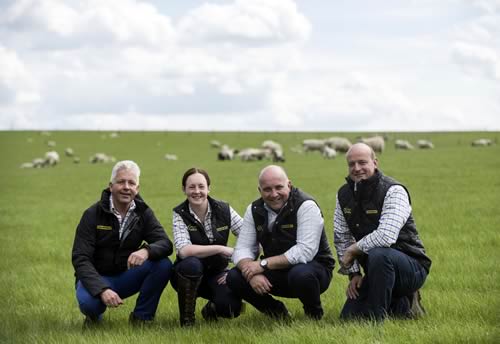2018-06-01 |
New Grass Varieties from Barenbrug
The 2018/19 Recommended Grass and Clover List (RGCL) for England and Wales has been published and once again varieties bred by Barenbrug UK feature highly throughout.
In total, 24 ryegrass varieties, which were either bred by Barenbrug or its partners, appear on the list alongside four brand new varieties that feature for the first time.
Barenbrug UK agriculture team l to r James Ingles, Mhairi Dawson, David Linton and Roger Bacon.
Making their debut are Galgorm and Callan – two varieties of diploid perennial ryegrass, which were developed by forage grass experts at Barenbrug in cooperation with the team at the Agri-Food and Bio-Sciences Institute (AFBI). In addition, two new tetraploid ryegrass varieties make the list for the first time: Bannfoot, a tetraploid hybrid ryegrass arising from the AFBI / Barenbrug partnership; and Barimax, a tetraploid Italian ryegrass from Barenbrug.
In terms of grass performance, each of Barenbrug’s new varieties offer farmers something slightly different:
-
Galgorm is an intermediate diploid perennial ryegrass, with a heading date of 22nd May, that offers very good total annual yields combined with a very good mid-season D-value of 78.3D under simulated grazing management. Galgorm has an excellent first cut of 107% and an early grazing yield of 112%. It also offers very good autumn yields coupled with very good crown rust resistance.
-
Callan is a late diploid perennial ryegrass with a heading date of 1st June. Offering very good spring yields under simulated grazing management (117%), Callan delivers a very good total yield under conservation management of 102%. It also offers very good resistance to crown rust.
-
Bannfoot is an exciting new tetraploid hybrid ryegrass with a heading of 19th May. Bannfoot has a high percentage of perennial parentage meaning it is incredibly persistent - as demonstrated by its third year yield figure (105%), which has the highest 3rd year yield of all hybrid ryegrasses on the RGCL. Alongside an excellent yield in year three, farmers that sow Bannfoot can expect excellent first cut yields and high resistance to crown rust.
-
Barimax is an Italian tetraploid that heads on the 20th May and provides strong first and second cut yields as well as good total year figures for both year one and two. The first cut quality of Barimix is 71.9D and it has a crown rust resistance score of 7.3.
Forage varieties, available from Barenbrug, that have appeared on the RGCL for England and Wales before, and which feature again include:
-
Clanrye, Dunluce, Glenariff, Moira and Seagoe, which have been established on hundreds of UK farms and created excellent swards
-
Caledon and Glenarm, which were added to the Recommended List for England and Wales in 2015
-
Glasker and Gosford, which were added in 2016
-
Fintona, which was first listed in 2014 and remains the highest yielding ryegrass ever produced by any breeder
Mhairi
Dawson, Research & Development Manager for Forage
at Barenbrug UK, said:
“Naturally we are over the moon that four
of our new varieties have been included on the Recommended Grass
and Clover list for England and Wales for 2018/19 - alongside
so many of our existing varieties. This achievement, and the fact
that so many of our varieties continue to appear year after year,
is testimony to the quality of our grass breeding programmes.
The continual investments we make in our varieties are clear to
see. The result is grass with genetics that stand the test of
time, give farmers peace of mind and - most importantly, provide
a good return on investment. In the current market, that’s more
important than ever.”

